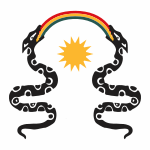| This article includes a list of general references, but it lacks sufficient corresponding inline citations. Please help to improve this article by introducing more precise citations. (September 2013) (Learn how and when to remove this message) |
In the ancient religion and mythology of Peru, Ecuador, and Bolivia, an apu is the term used to describe the spirits of mountains and sometimes solitary rocks, typically displaying anthropomorphic features, that protect the local people. The term dates back to the Inca Empire.
Meanings
The word apu has several possible meanings, depending on context.
Apu means "Lord" in Quechua. The Inca religion uses the term 'apu' to refer to a mountain with a living spirit; the body and energy of the mountain together form the spirit's wasi ("home" or "temple"). A number of different terms are used for different types of apu:
- Ayllu Apu – protector of a village (such as Apu Manuel Pinta)
- Llaqta Apu – protector of a region (Apu Mama Simona)
- Suyu Apu – protector of a country (such as Apu Salkantay or Apu Ausangate)
Besides mountains there are other living beings that are considered apu – the so-called Tiqsi Apu. In the Andean tradition, Pachamama (Cosmic Mother), Wiraqucha (God or Cosmic Father), Tayta Inti (Father Sun), Ttita Wayra (Father Wind), Mama Unu (Mother Water), Mama Killa (Mother Moon) and Mama Ch'aska (Mother Stars) can be seen all over the world, which is why they are known as Tiqsi Apu, meaning "Global Apu". Jesus and Mother Mary for the same reason are also known as Tiqsi Apu.
Apu
The twelve sacred apu of Cusco are: Ausangate, Salkantay, Mama Simona, Pillku Urqu, Manuel Pinta, Wanakawri, Pachatusan, Pikchu, Saksaywaman, Viraqochan, Pukin, and Sinqa.
Other apu in Bolivia and Peru are: Akamari, Antikuna, Chachani, Kimsa Chata, Illampu, Lady of Illimani, Machu Picchu, Pitusiray, Putucusi, Qullqipunku, Sinaqara, Tunupa, Willka Wiqi (Wakay Willka), Wamanrasu, Wayna Picchu and Yanantin.
References
- Steele, Paul Richard; Allen, Catherine J. (2004). Handbook of Inca Mythology. ABC-CLIO. pp. 213-214. ISBN 9781576073544.
Apu .
- ^ "Inka World: Enjoy all of the Inca tradition".
External links
- Sacred Mountain Expedition: April 2007
- Glossary of Terminology of the Shamanic & Ceremonial Traditions of the Inca Medicine Lineage as Practiced in the United States, A
| Inca Empire | ||
|---|---|---|
| History |  | |
| Inca society | ||
| Inca religion | ||
| Inca mathematics | ||